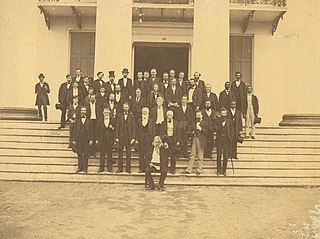More than 1,500 African American officeholders served during the Reconstruction era (1865–1877) and in the years after Reconstruction before white supremacy,disenfranchisement,and the Democratic Party fully reasserted control in Southern states. Historian Canter Brown Jr. noted that in some states,such as Florida,the highest number of African Americans were elected or appointed to offices after the end of Reconstruction in 1877. The following is a partial list of notable African American officeholders from the end of the Civil War until before 1900. Dates listed are the year that a term states or the range of years served if multiple terms.

Philip Joseph was an African American Republican politician and journalist in Reconstruction and Jim Crow-era Alabama.
Alfred Brown Osgood was an American legislator and Christian minister in Florida.
Frederick Hill was a politician in Florida during the Reconstruction era. He was a delegate to the 1868 Florida Constitutional Convention and represented Gadsden County in the Florida Legislature. He also served as a Gadsen County Commissioner and was the postmaster in Quincy,Florida for several years.

Greene Shadrach Washington Lewis was a leader among African Americans and a state legislator in Alabama during the Reconstruction era 1868–1876. He represented Perry County,Alabama.

Benjamin F. Royal was a state senator in Alabama during the Reconstruction era. He was elected to the state senate in 1868,and was the first African American to serve in the chamber. He represented Bullock County and served for nine years. He served as a Republican,and had stated that "he could as well be an infidel as to be anything else than a Republican". He was a Union League organizer.

Hugh A. Carson was a delegate to Alabama's 1875 Constitutional Convention and served as a state representative for two terms in Alabama during the Reconstruction era. He was a former slave.
Lawson Steele was a state legislator in Alabama during the Reconstruction era. He represented Montgomery County,Alabama. He was a leader in the A.M.E. Church. In 1870,he had substantial and was one of the wealthier African American legislators.
John Carraway was a tailor,seaman,civil rights activist,and politician in the United States. In Alabama during the Reconstruction era,he served as a delegate to the 1867 Alabama Constitutional Convention. He also served on Mobile,Alabama's city council,and in the Alabama House of Representatives.

D. J. Daniels was a state legislator in Alabama. He served in the Alabama Senate in 1872 representing Russell County,Alabama. He was a member of the Alabama House of Representatives in 1874 until being ousted for not being registered or having taken an oath. Daniels and Prince Gardner received more than 2,600 votes while the candidates who replaced them,W. H. Chamber and A. G. Jones,received less than 2,000.
Charles Oscar Harris was an American public official and state legislator in Alabama.
Henry Hunter Craig was an American grocer,barber and politician who represented Montgomery County,Alabama in the Alabama House of Representatives from 1870 to 1872
Frank Adamson was a state legislator who served in the South Carolina House of Representatives during the Reconstruction era,from 1870 to 1874.
Richard R. Samuels was a farmer,blacksmith and state legislator in Arkansas. He was a delegate to the 1868 Arkansas Constitutional Convention from Hempstead County,Arkansas. He was one of 8 African American delegates at the convention. He represented Hempstead County,Arkansas in the Arkansas House of Representatives in 1868 and 1869. He was a Republican. He was one of the first six African Americans to serve in the Arkansas Legislature. At The Brindle Convention in 1872 he was nominated for the position of superintendent of the penitentiary. He also served on the grand jury for a fraud and corruption trial in Hempstead. Later in 1872 he was elected as clerk for Hempstead to serve with James W. Vance who was re-elected as the Sheriff. A few months later judge T. G. T. Steele put a restraining order on Samuels and Thomas M. Higgs commanding them not to exercise their duties of clerk and deputy sheriff. T. G. T. Steele then later issued writs for the arrest of Samuels,Mitchell and Higgs for contempt of these order but was then himself investigate by the Senate for his conduct and exceeding his jurisdiction.
Jules A. Masicot was a state legislator in Louisiana. He served in the Louisiana House of Representatives and Louisiana State Senate and at the state's 1868 constitutional convention.
George W. Barber was a carpenter,farmer and state legislator who served in the South Carolina State Senate during the Reconstruction era from 1868 until 1872.
Oscar Crozier was a sugar planter and state legislator who served in the Louisiana State Senate during the Reconstruction era from 1874 until 1875.

Curtis Pollard was a minister,farmer,store keeper and state legislator who served in the Louisiana State Senate during the Reconstruction era.
T. B. Stamps was a businessman,coroner,and newspaper editor who served in the Louisiana House of Representatives and Louisiana State Senate during the Reconstruction era.
Jordan R. Stewart was a state legislator who served in the Louisiana House of Representatives and the Louisiana State Senate during the Reconstruction era.






